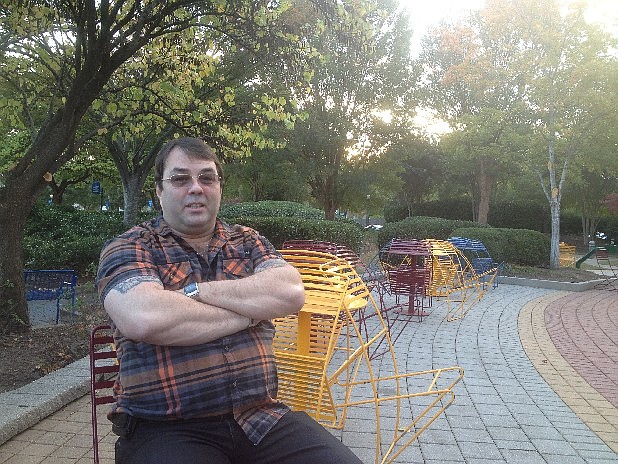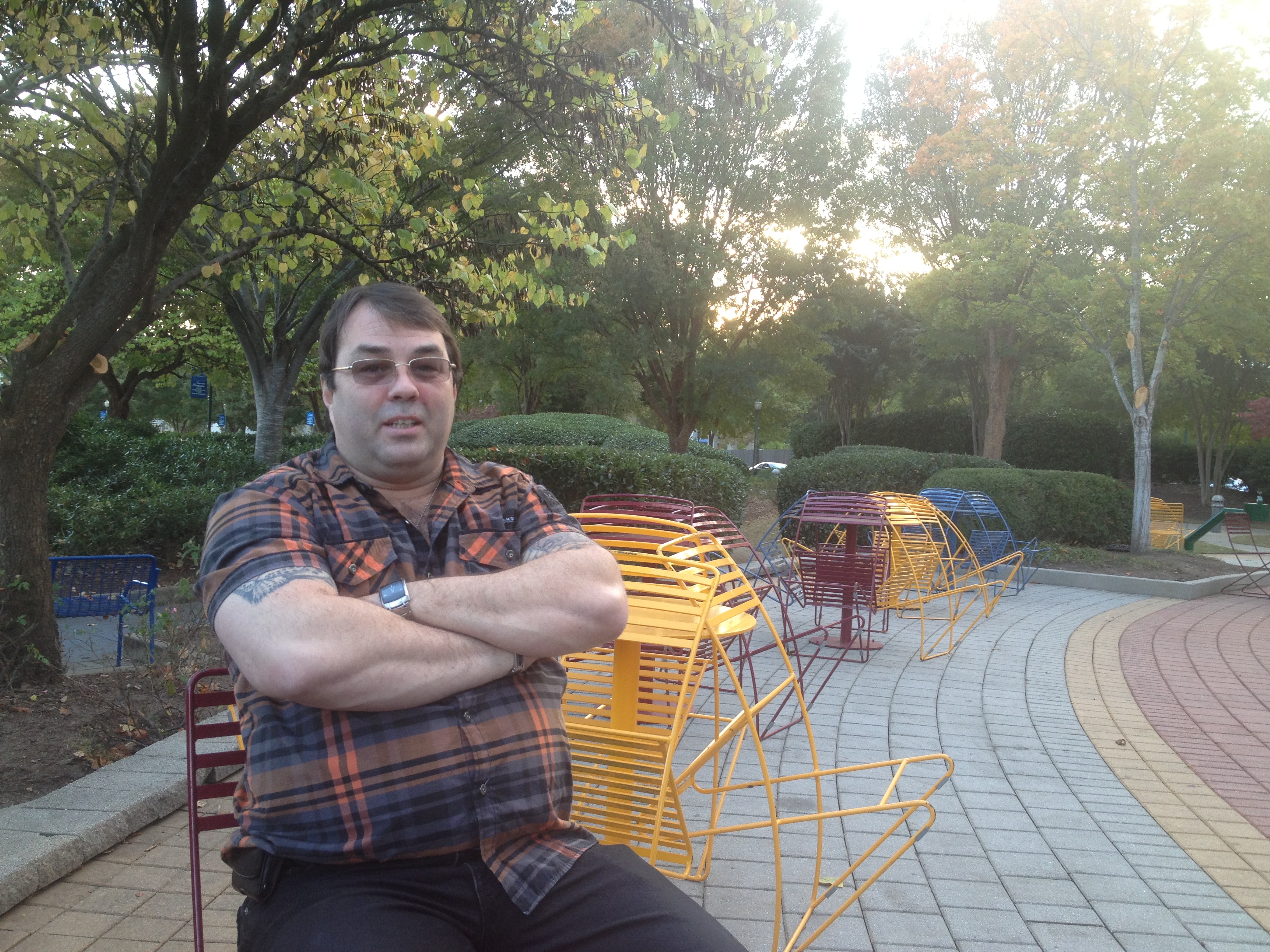TO LEARN MOREEven those who don't live in one of the 10 states in which "Sesame Street" is conducting its pilot program still can get access to the resources:• Visit www.sesamestreet.org/incarceration for the full workshop.• Go to the "Sesame Street in Communities" YouTube channel to watch all the video.• Like the "Sesame Street in Communities" Facebook page to get quick, daily updates.TO HELP OR GET HELP• The Big Brothers, Big Sisters program in Chattanooga is looking for mentors to spend time with local at-risk children. Call 423-698-8016 for more info.• Charles Harper, the subject of this article, is now a drug abuse counselor. Anyone struggling with addiction, or anyone who is raising a child with an incarcerated loved one, can call him at 423-355-2828.
Charles Harper didn't know what to tell his daughter, so he lied.
He was a disc jockey with a reputation in the local club scene, and he told her he hungered for more. He told her he was leaving, that he wanted to make it big out West -- maybe Texas, maybe California.
But Tabitha's half-sister told her the truth, and soon enough she saw for herself. In September 2001, the 10-year-old sat across from her father at the Catoosa County Jail, a wall of glass separating the two.
She wanted to hug him.
"I didn't understand the severity," she said.
About eight months earlier, Harper had been driving north on Interstate 75 when he flicked a cigarette out his window. A trooper stopped him for littering, and a search followed.
In a pocket of Harper's cargo pants, the trooper found a pound of marijuana and 2 ounces of methamphetamine. The Catoosa County Sheriff's Office charged him with possession and trafficking.
At the time, Harper didn't have much of a relationship with Tabitha. A drug addict, he said he didn't want to expose her to his lifestyle. But in January 2001, the same month Harper was pulled over, Tabitha found her mother dead.
So in the months between Harper's arrest and his eventual incarceration, he reunited with his daughter. When Tabitha visited him at the jail, she looked heartbroken. Her older half-sister took care of her, but Harper could tell she wanted to be with him.
He couldn't understand why.
I'm a meth addict, he thought. I'm an Ecstasy addict, a club addict, a sex addict.
"I used to call myself an equal-opportunity addict," he said.
Harper, now 45, vowed to get to know his daughter during his stints at Wheeler County Detention Center and Rivers State Prison. And so began a stream of letters to Tabitha. He didn't try to write anything poetic or life-changing. Just the simple stuff -- what he ate for lunch, what he saw on TV.
The content didn't have to be deep, he told himself. Just keep churning them out. Just keep giving her attention, the only way he could.
"It's not much," he thought. "But it's a letter in the mail."
•••
Popular parenting books don't prepare people for prison. They don't say how to raise a child when a dad or mom gets locked up. But in that moment, a parent's reaction can affect a child for the rest of his or her life.
That's why the creators of "Sesame Street" launched an online workshop aimed at families in those situations. "Little Children, Big Challenges: Incarceration" was designed to help 3- to 8-year-olds understand why their parent went away and to help caregivers offer guidance.
The program, which launched in June, is available online. There are videos with a Muppet named Alex, who at first is embarrassed because his father is in prison. The host of the online episodes tells Alex that it's OK to feel sad or angry, and it's a good idea to talk to an adult about his feelings.
The host also explains why Alex's parent is gone.
"Incarcerated is when someone breaks the law -- a grown-up rule -- and then they have to go to jail or prison," she says on the program.
The workshop offers videos with real children of incarcerated parents telling their stories. There are also videos about the caregivers of these children, a storybook and activities designed to help these kids.
"Sesame Street" has tackled tough topics with online-only programs before. There is a series designed for families with military parents and another one for children of divorce.
A research group helps "Sesame Street" employees identify specific groups of children who may need a little extra help. About two years ago, the group began examining children of incarcerated parents, said Lynn Chwatsky, Sesame Workshop's vice president for initiatives, partnerships and community engagement.
From there, the "Sesame Street" team recruited experts to create the curriculum for the one-year pilot program that launched in 10 states in June. Chwatsky didn't know the program's cost, but that one and one about divorce launched last year together cost "multiple millions of dollars."
Members of the Sesame Workshop team partnered with the departments of corrections in those 10 states to reach inmates and their families. They worked with local organizations and experts such as mental health providers, school social workers and psychologists.
At the end of the pilot year, an expert will interview caregivers to see whether they communicate better about the parents' incarceration, and study the children's behavior and their ability to form relationships.
The findings will determine whether the workshop should be expanded beyond the first 10 states.
Tennessee, Alabama and Georgia aren't in the pilot group, but all the elements of the workshop are online at no charge.
•••
It's difficult to know exactly how many kids have incarcerated parents. Academic reports vary, though a 2010 study by the Pew Research Center estimated that 2.7 million U.S. children have parents who are locked up.
That's one out of every 28 children -- about one in every classroom.
Local figures also are difficult to gauge. Ansel Peak, the executive director of Big Brothers, Big Sisters in the greater Chattanooga area, says about one-fourth of children in the program have a parent in prison.
But, he said, you wouldn't notice these children among all the others. Big Brothers, Big Sisters works with children in risky situations -- poverty, divorce, dangerous neighborhoods.
"It's just one extra characteristic, one extra little piece of baggage," Peak said of incarcerated parents.
And that's the problem with understanding the effect of incarceration on children, some academics say. In general, people who go to prison come from tough backgrounds. They have less money. They live in violent areas. They aren't well educated.
And their children likely are in the same situation. So experts struggle to grasp which of these tough social factors leads to problems for a child.
Still, taking all the other factors into account, having a parent in jail or prison can lead to significant issues, said Geraldine Oades-Sese, an assistant professor of pediatrics at Rutgers University.
Having a parent in prison can bring shame, anger and rage.
And rage? Rage can lead to misbehavior and problems in school. That can cause depression and anxiety and lead the child to even worse problems, such as substance abuse.
For children from disadvantaged backgrounds, falling behind at any point can ruin their lives.
Oades-Sese, who will be the one to evaluate the "Sesame Street" workshop next year, believes the program can help offset the effects of a parent's incarceration on a child. Most importantly, the program encourages caregivers to explain the situation to children.
Often, adults will tell children the missing parent went away for work, or to serve in the military, or to go to college. But eventually, children figure out where their parents really are.
"These kids start reacting because they know the truth, and they're hearing a lie," Oades-Sese said. "Inconsistency is a problem. You're supposed to be the person I trust the most, and you're not being honest."
Tim Dempsey runs Chattanooga Endeavors, a nonprofit that helps felons get jobs. He also thinks the "Sesame Street" workshop will be effective.
In particular, he said, it will encourage the children to express themselves. Too often, they keep their doubts and fears inside, unsure why they feel the way they do.
"If a child has a disrupted childhood," he said, "it throws them into more chaos. Chaos makes it difficult for them to perform in all sorts of areas. And once they fall behind, it's difficult to keep up. And this starts the cycle of generational crime."
Experts also believe the program will lead the locked-up parent to communicate with the child from prison.
According to a report by the Urban Institute, maintaining that relationship may help the child's emotional stability more than anything else.
It may be uncomfortable, but it's necessary.
•••
From prison, Harper finally got to really know his daughter. The process was slow, but he kept sending her mail. When Tabitha moved to Oklahoma, he tracked down her address and continued writing.
For years, Harper simply signed the letters "Charles." And the messages remained shallow, just a day-to-day update of life in prison. But he said he grew close to God, began leading Bible studies five days a week.
Tabitha wrote back. But she, too, kept her emotions hidden. She didn't tell him how, when she cheered at high school games, she wished her dad was in the stands. She was unsure whether she could trust him with intimate information.
"I didn't know what to believe, what not to believe," she said. "There's so much opinion about others who are in jail. They say they're bad people."
Eventually, from jail, Harper apologized. He said he was sorry for abandoning her, for leaving her without a parent. She wrote back, saying that she forgave him.
"I love you because you're my father," she told him, "but I don't like you at all."
That struck Harper.
"As bad as I've treated this human being," he thought, "she still loves me. Even though she doesn't like me, she's still willing to say she loves me. That's what love is."
Finally, in February 2007, Harper left prison. He and Tabitha, now 22, continued to talk. They grew closer.
She still lives in Oklahoma, and he still lives here. But he said they call each other about 20 times a week and text throughout the day. About two years ago, when Tabitha found out she was pregnant, she told her father first.
Today, Harper says his daughter is his best friend.
She says the same.
Contact staff writer Tyler Jett at 423-757-6476 or at tjett@timesfreepress.com.

